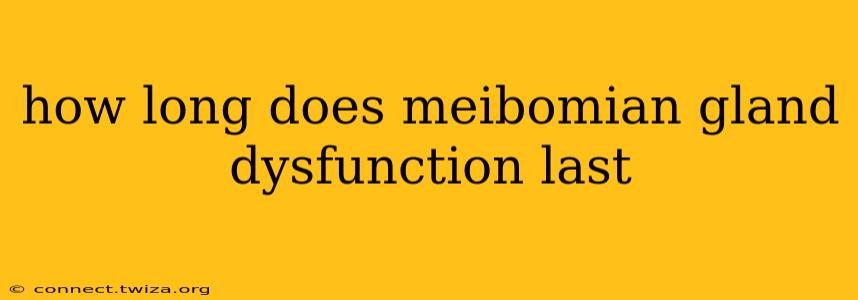Meibomian gland dysfunction (MGD) is a common and often chronic condition affecting the eyelids. Unlike a short-term illness, MGD's duration is highly variable, depending on several factors. There's no one-size-fits-all answer to how long it will last, but understanding the influencing factors can provide a clearer picture.
What is Meibomian Gland Dysfunction (MGD)?
Before delving into the duration, let's briefly recap what MGD is. The meibomian glands are located in your eyelids and produce an oily substance that helps keep your tears stable and prevent evaporation. MGD occurs when these glands become blocked or malfunction, leading to a variety of symptoms. These can include dry eye, blurry vision, burning or stinging sensations, and even eye irritation and inflammation.
How Long Does MGD Last? The Variables at Play
The duration of MGD is highly individualized and depends on several factors:
-
Severity of the condition: Mild cases might experience symptoms intermittently and for shorter periods, while severe cases can be persistent and long-lasting.
-
Underlying causes: Some individuals may have an underlying condition contributing to MGD, such as rosacea, blepharitis, or hormonal imbalances. Addressing these underlying issues is crucial for long-term management.
-
Treatment adherence: Consistent application of prescribed treatments, such as warm compresses, lid scrubs, or medications, significantly impacts the duration and severity of symptoms. Ignoring or inconsistently following treatment plans can prolong the condition.
-
Individual response to treatment: People respond differently to treatments. What works well for one person may not be as effective for another. This requires close collaboration with an ophthalmologist or optometrist to find the most suitable treatment approach.
-
Lifestyle factors: Certain lifestyle choices, such as prolonged screen time, insufficient blink rates, and a dry environment, can exacerbate MGD symptoms and prolong its duration.
How Long Before I See Improvement?
Many patients report noticing some improvement in symptoms within a few weeks of starting a consistent treatment regimen. However, complete resolution may take longer, sometimes several months or even longer, depending on the severity and individual response.
Is MGD Curable?
While there's no single "cure" for MGD, effective management strategies significantly reduce symptoms and improve quality of life. Many individuals can achieve long-term symptom control through consistent treatment and lifestyle modifications. It's important to understand that MGD is often a chronic condition requiring ongoing management.
Can MGD Go Away on Its Own?
In some mild cases, symptoms might improve or even resolve spontaneously. However, relying solely on spontaneous remission is not recommended. Early diagnosis and treatment are crucial to prevent long-term complications and ensure effective management.
What Happens if MGD is Left Untreated?
Leaving MGD untreated can lead to several complications, including chronic dry eye, corneal damage, and even vision impairment. Early intervention is crucial for preventing these complications.
What Are the Long-Term Effects of MGD?
If MGD is not properly managed, it can lead to persistent discomfort, reduced visual acuity, and increased susceptibility to infections. Regular check-ups with your eye care professional are vital for long-term monitoring and management of the condition.
Conclusion: Managing MGD for Long-Term Eye Health
While the duration of MGD varies, proactive management through appropriate treatment and lifestyle adjustments is key. Regular consultations with an ophthalmologist or optometrist are essential for assessing the severity, tailoring treatment plans, and monitoring progress. By actively addressing MGD, individuals can significantly improve their eye health and quality of life. Remember, early intervention is crucial for achieving the best long-term outcomes.
